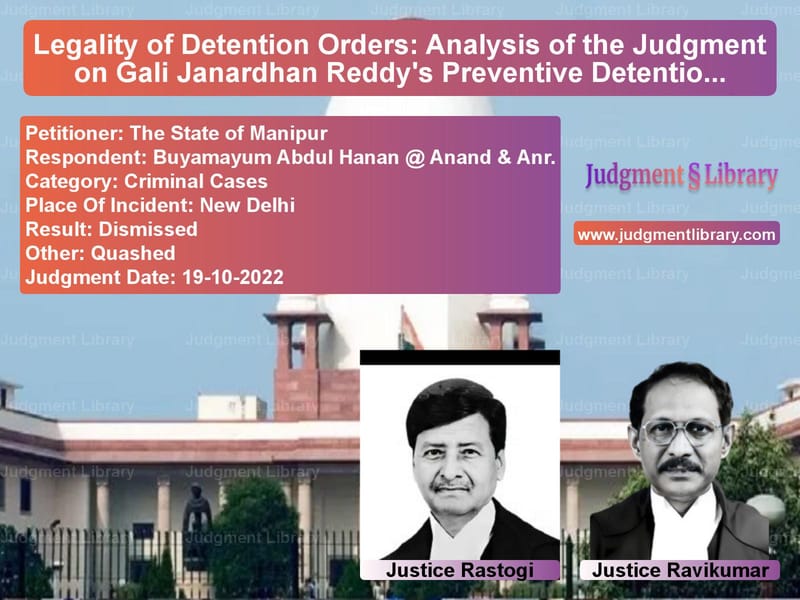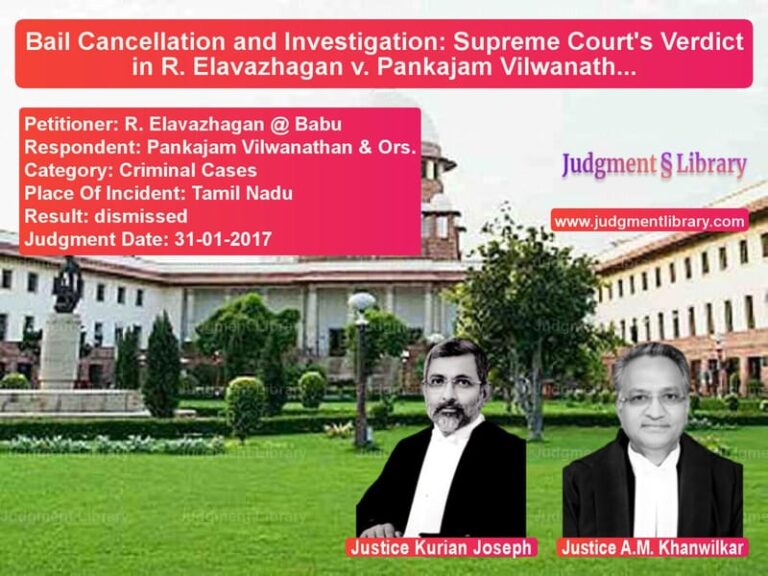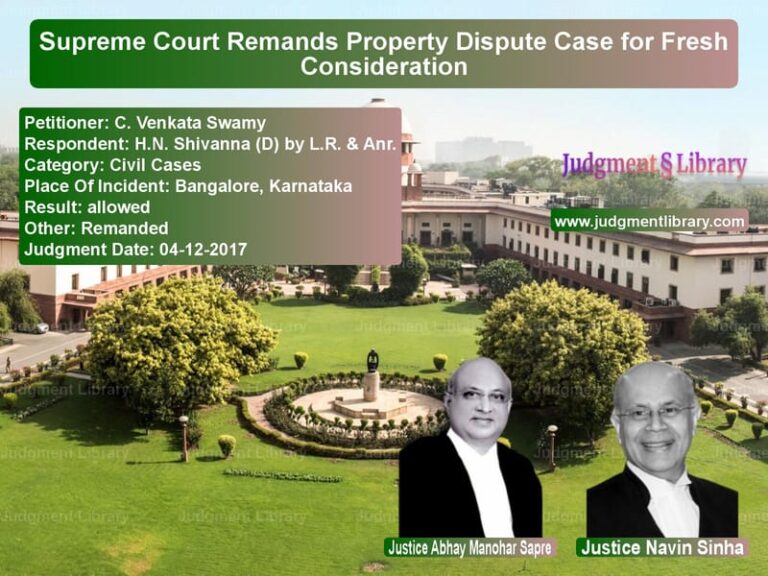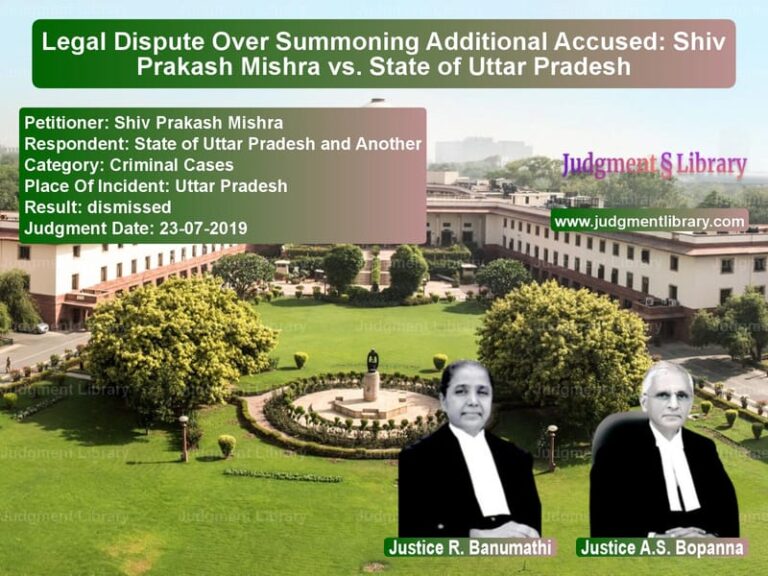Legality of Detention Orders: Analysis of the Judgment on Gali Janardhan Reddy’s Preventive Detention
The case of Gali Janardhan Reddy, involving his preventive detention under the Prevention of Illicit Traffic in Narcotic Drugs and Psychotropic Substances Act, 1988 (PITNDPS Act), brings forth critical issues concerning the legal requirements for detention orders, particularly the right to make an effective representation under Article 22(5) of the Constitution. This case, dealing with an accused who was influential in certain regions of India, revolves around the denial of sufficient documentation for the detainee to make a representation regarding his detention. The High Court’s decision to set aside the detention order emphasizes the importance of transparency and fairness in the preventive detention process.
Factual Background
The accused, Gali Janardhan Reddy, a prominent political figure, was detained under the provisions of the PITNDPS Act, which is intended to prevent illicit trafficking in narcotic drugs and psychotropic substances. In 2021, Reddy’s detention order was passed by the government of Manipur. The order was based on certain documents which the detaining authority relied upon to establish the necessity of Reddy’s detention. However, the petitioner contended that the documents provided to him were not legible, thus depriving him of his right to make an effective representation against his detention.
Respondent No. 1 (the accused) filed a writ petition under Article 226 of the Constitution before the High Court of Manipur, challenging the order of detention. The crux of the challenge was that the documents provided to him, upon which the grounds of detention were based, were blurred and unreadable. Consequently, Reddy argued that his constitutional right to make an effective representation was violated. The High Court ruled in favor of the petitioner and set aside the detention order, highlighting the failure of the authorities to provide legible copies of the documents.
The Petitioner’s Arguments
The petitioner’s counsel argued that the non-supply of readable documents fundamentally infringed upon the detainee’s right under Article 22(5) of the Constitution. This right guarantees that any person detained shall be informed of the reasons for their detention and shall have the opportunity to challenge the detention through a representation. In this case, the petitioner claimed that the documents provided were so poorly reproduced that they were impossible to read, preventing Reddy from understanding the full grounds of his detention and making a meaningful challenge.
The petitioner referred to several precedents, including Smt. Dharmista Bhagat v. State of Karnataka, Manjit Singh Grewal v. Union of India, and Mehrunissa v. State of Maharashtra, which emphasized the critical nature of providing clear and legible documentation for detainees to mount a proper defense. The petitioner’s counsel argued that this failure to provide legible documents rendered the detention unlawful, as it violated the basic tenets of justice and fairness.
The Respondent’s Arguments
On the other hand, the respondent, represented by the State of Manipur, argued that all the relevant documents relied upon by the detaining authority had been provided to the detainee. The respondents contended that the accused had not raised any objections at the time the documents were furnished, nor had he requested copies of any unreadable documents until after the final detention order was passed. The respondents argued that the failure to request readable documents at the appropriate time should prevent the detainee from challenging the detention order later on the grounds of illegibility.
The State also contended that the High Court’s decision to set aside the detention order was not legally sustainable. The argument was that the procedural requirements had been met, and that there was no constitutional violation based on the supply of documents, as the detainee had not shown that the illegibility of the documents had prevented him from making a representation earlier.
The Legal Issue
The central issue in this case was whether the failure to supply legible copies of the documents relied upon by the detaining authority resulted in a violation of the detainee’s right to make an effective representation. Article 22(5) of the Constitution mandates that every detainee must be informed of the reasons for their detention and should be provided the opportunity to challenge the detention effectively. The non-supply of readable documents directly impacted this fundamental right, as it hindered the detainee’s ability to understand and challenge the grounds of detention.
Read also: https://judgmentlibrary.com/appeal-allowed-in-murder-conviction-case-key-court-insights/
Another important aspect was whether the detainee had to raise the issue of illegibility of documents at the time they were provided, or if he could raise this issue later in his legal proceedings. This raised the question of whether the right to challenge the detention was contingent upon the detainee’s immediate objection to the quality of the documents.
The Court’s Analysis and Decision
The Supreme Court, after hearing the arguments, affirmed the High Court’s decision, noting that the right to make an effective representation is a fundamental right that cannot be undermined by procedural failings such as the non-supply of legible documents. The Court relied on settled legal principles that the supply of clear and readable copies of documents is essential for the detainee to exercise this right effectively. The Court also found that even though the detainee had not raised the issue of illegibility at the time the documents were provided, this did not negate his fundamental right to contest the legality of his detention.
The Court referred to several precedents, including Ramchandra A. Kamat v. Union of India and Bhupinder Singh v. Union of India, which established that failure to provide legible copies of the documents relied upon for detention renders the detention order invalid. The Court emphasized that even if the issue was raised belatedly, the violation of the detainee’s right under Article 22(5) could not be overlooked. As a result, the Court dismissed the respondent’s appeal and upheld the High Court’s decision to set aside the detention order.
Key Legal Principles
- The right to make an effective representation against a detention order is a fundamental right under Article 22(5) of the Constitution.
- Failure to supply legible copies of the documents relied upon for detention renders the detention order illegal and in violation of the detainee’s right to challenge the order.
- The detaining authority must provide the detainee with all the necessary information to challenge the detention, including readable copies of the documents that form the basis of the detention.
- Even if the detainee does not immediately raise the issue of illegibility, the violation of their fundamental rights cannot be ignored.
Conclusion
This judgment reaffirms the principle that the right to make an effective representation is crucial to the judicial process in preventive detention cases. It highlights the importance of ensuring that detainees are provided with clear and legible documentation to challenge their detention. The decision also reinforces the need for detaining authorities to adhere to constitutional safeguards and legal procedures in order to protect individual rights and maintain the rule of law.
Petitioner Name: The State of Manipur.Respondent Name: Buyamayum Abdul Hanan @ Anand & Anr..Judgment By: Justice Rastogi, Justice Ravikumar.Place Of Incident: New Delhi.Judgment Date: 19-10-2022.
Don’t miss out on the full details! Download the complete judgment in PDF format below and gain valuable insights instantly!
Download Judgment: the-state-of-manipur-vs-buyamayum-abdul-hana-supreme-court-of-india-judgment-dated-19-10-2022.pdf
Directly Download Judgment: Directly download this Judgment
See all petitions in Bail and Anticipatory Bail
See all petitions in Fraud and Forgery
See all petitions in Custodial Deaths and Police Misconduct
See all petitions in Terrorist Activities
See all petitions in Judgment by Ajay Rastogi
See all petitions in Judgment by C.T. Ravikumar
See all petitions in dismissed
See all petitions in Quashed
See all petitions in supreme court of India judgments October 2022
See all petitions in 2022 judgments
See all posts in Criminal Cases Category
See all allowed petitions in Criminal Cases Category
See all Dismissed petitions in Criminal Cases Category
See all partially allowed petitions in Criminal Cases Category







